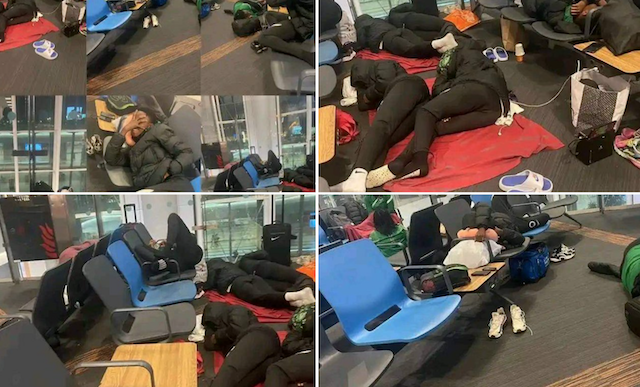The Nigeria Football Federation has explained why players and officials of the U20 Girls National Team, Falconets, were stranded at the Istanbul Airport.
After being eliminated from the FIFA U-20 Women’s World Cup, Nigeria’s U-20 Women’s team, the Falconets, are reportedly experiencing a torturous journey back to the country from Costa Rica.
The Falconets fell short in the quarter-final as they lost 2-0 to the Netherlands in a match that ended early Monday morning.
The Falconets then had to depart Costa Rica almost immediately after their elimination at about 6.30 am Monday.
According to Colin Udoh, a former Super Eagles media officer and committee member with the Nigeria Football Federation, the Falconets had to spend more than 48 hours on a journey that should have been completed in a day and despite that, the Falconets are still thousands of miles away from home.
?The NFF did not book the team?s tickets from Costa Rica, FIFA did
Udoh revealed on Twitter on Tuesday morning how the Falconets were stranded in Turkey, at the Istanbul airport on a 24-hour layover. He showed photos of the national team players sleeping on airport benches and on the floor of the airport.
?The NFF did not book the team?s tickets from Costa Rica, FIFA did
However, on Wednesday August 24, the NFF deflected blame, saying FIFA booked the team’s tickets and not the NFF.
“The NFF did not book the team’s tickets from Costa Rica; FIFA did. FIFA also did not envisage the hitches that saw the team delayed for more than three hours in Bogota, and another one hour in Panama. By the time the team got to Istanbul, the flight to Abuja had left.” The NFF statement said .
“Our officials pleaded for compassionate transit visas so as to take the players and officials to a hotel inside the town, but this was not possible as they were informed that Nigeria had been removed from the list of countries whose citizens were issued visa-on-arrival in Turkey. The airline then took the team to a sleeping area at the airport and gave them tickets to have meals every five hours. This situation has nothing to do with NFF, who had made arrangements to receive the team in Abuja before the complications in travel arrangements,” NFF General Secretary, Dr Mohammed Sanusi, explained.
On the issue of body-wear, the NFF said: “The players were handed three sets of green jerseys and two sets of white jerseys, several house-wear types and training jerseys. The players opted to wash only their jersey top (no other stuff) because when the first set of body-wear was sent to the laundry people at the hotel, it returned with some FIFA and NFF badges at the front and names at the back peeled by the machine.”

